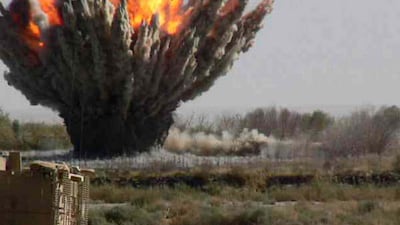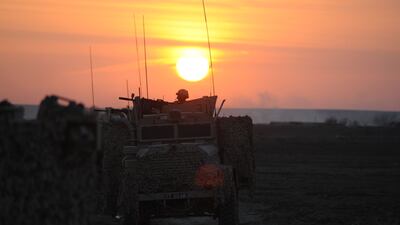Follow the latest updates on Afghanistan here
Former British Army officer Capt James Cadbury has one distinct memory from his nine-month tour of Afghanistan, during which he was involved in heavy fighting.
In December 2007, his mobile brigade had been ordered to drive to Musa Qala, in southern province Helmand, to help recapture the area from the Taliban.
“During the battle, a man sauntered up to our line, and asked to speak to the commander,” recalled Capt Cadbury, who has lived in Dubai for 12 years, and works as a strategy consultant in the region.
“He smiled broadly, was oddly charming and clearly not a goat herder. He asked me plainly why we bothered to fight, 'because we are patient, and you will leave, some day'."
That day has now come. As the Taliban negotiate the surrender of Afghan capital Kabul and western forces evacuate their remaining citizens, Capt Cadbury is filled with bitter regret for the lives lost and ruined.
“Early on, it became clear we could not win 'the fight' in the long term,” said Capt Cadbury, who was in the King's Royal Hussars regiment and based in Helmand province.
“The Taliban blended into the community and no one was going to point them out. Because if the Taliban saw you working with their enemies, they didn't just kill you, they killed your family.
“We spoke to one village elder about delivering medical supplies. It took days before he would even speak to us.
“Finally, he accepted the supplies and the Taliban killed him the following week, as a lesson to the rest of the village.
“The message to locals was clear: 'Don't even talk to them, just ignore them, don't accept their help. We are your help, we are your salvation, we are here to stay and they will leave.'
“This is what was happening on a national level. It was soul destroying.”
In total, 457 British and 2,312 US military personnel were killed fighting against the Taliban in Afghanistan. Tens of thousands were injured, many losing limbs from roadside bombs.
The western coalition adapted to the threat, with the British using improved armoured personnel vehicles, including the Mastiff, that could absorb the blasts.
But forces suffered regular casualties, damaging morale and leaving personnel with deep, unseen trauma.
Remarkably, no one in Capt Cadbury's squadron of 40 men was killed, but several were wounded in a rocket attack early in their mission, suffering life-changing injuries.
As he watched American troops withdraw this year and the Taliban advance, Capt Cadbury felt a deep anger – and a deeper sorrow.
“It was an almost politically impossible position. Those who look at the larger strategic piece knew that it was something that couldn't carry on indefinitely,” he said.
“But tens of thousands of people have been lost, damaged, and mentally scarred – and the end result is this.”
His experience of the Taliban has left him in no doubt of what awaits the residents of newly occupied towns and cities.
“Millions of women will be at the mercy of the Taliban, who will remove many of their rights, and that is one of the greatest tragedies,” said Capt Cadbury, the father of twin girls, aged 6.
“There are teenagers who have never known Taliban rule, girls who have been educated, and now they are going to be dragged back to the Stone Age.
“There will be pockets of absolute savagery, and there's now nothing we can do now, but watch. And that is the single greatest tragedy.”

































































